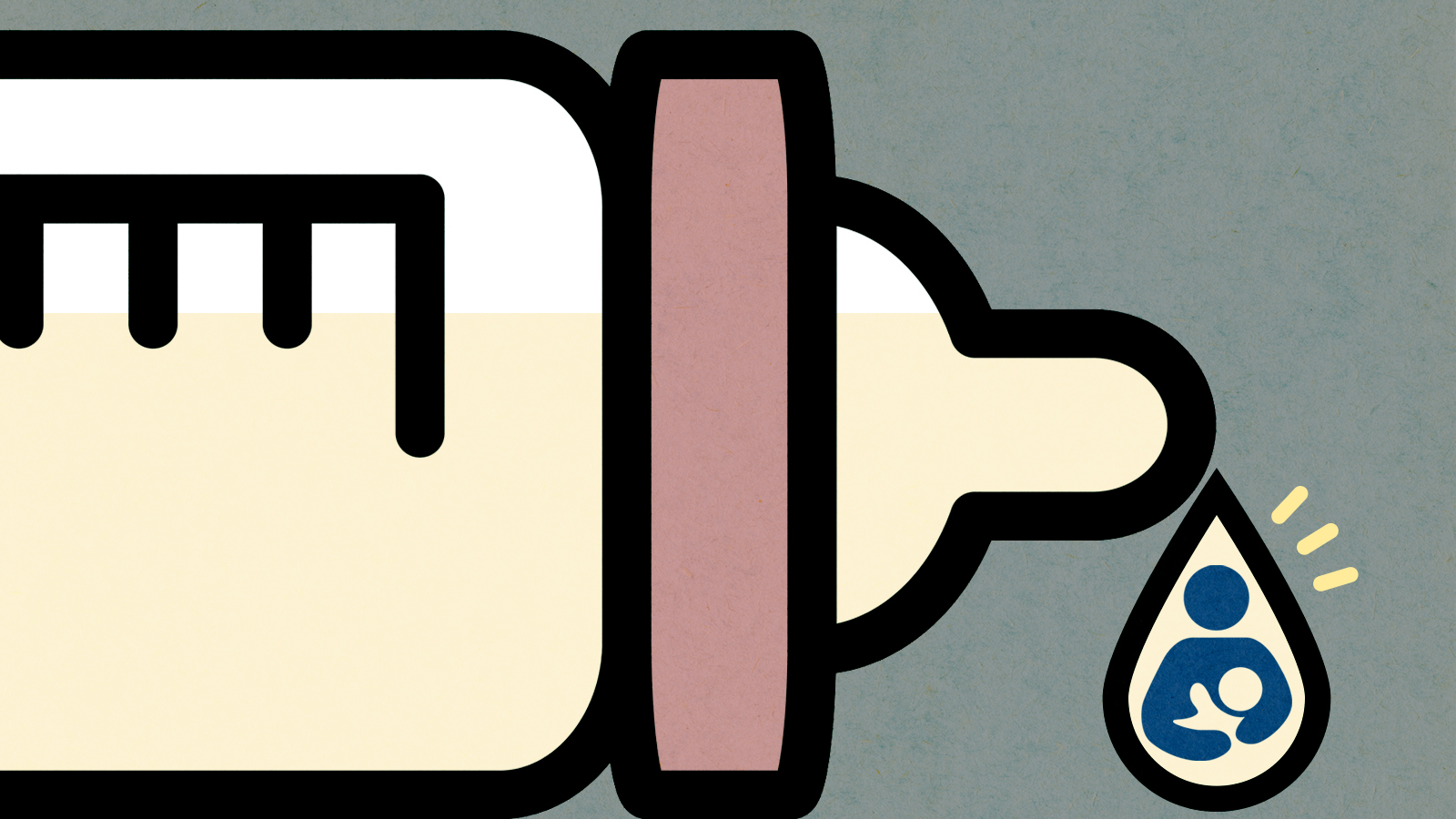What does breastfeeding have to do with the infant-formula shortage?
The sharpest opinions on the debate from around the web


A free daily email with the biggest news stories of the day – and the best features from TheWeek.com
You are now subscribed
Your newsletter sign-up was successful
President Biden this week invoked the Defense Production Act to speed up infant-formula production, part of a broader effort to address a shortage that has sent many parents dashing from store to store to find what they need to feed their babies. Biden's order requires suppliers to fulfill orders from baby-formula producers before other customers. He also authorized the Defense Department to use commercial aircraft to help bring in more imports from overseas, and the Food and Drug Administration reached a deal with Abbott Nutrition to reopen its baby formula factory, which was shut down in February over safety concerns, intensifying a crisis started by knotted supply chains.
But the crisis has ignited a heated debate over whether encouraging more people to breastfeed would ease the crisis. Bette Midler faced an angry backlash online after tweeting that breastfeeding was parents' best way out of the formula shortage because it's "free and available on demand." Critics called her advice "profoundly offensive and ignorant," noting that there are "countless reasons" why breastfeeding isn't best, or even possible, for many mothers.
Should breastfeeding be part of the debate on how to address formula shortage?
The Week
Escape your echo chamber. Get the facts behind the news, plus analysis from multiple perspectives.

Sign up for The Week's Free Newsletters
From our morning news briefing to a weekly Good News Newsletter, get the best of The Week delivered directly to your inbox.
From our morning news briefing to a weekly Good News Newsletter, get the best of The Week delivered directly to your inbox.
Pushing breastfeeding insults those who don't have the option
It is "woefully ignorant" to push breastfeeding as the solution to the formula shortage, says Elizabeth Spiers in The New York Times. "It is insulting to the many women who cannot breastfeed, or cannot produce enough milk to keep their babies fed." Formula is best for mothers who "can't or don't want to pump at work." It allows fathers to pitch in more. It also "can be a godsend" for those suffering from postpartum depression or sleep deprivation, helping them keep their babies nourished while restoring "some aspects of a normal life." Remember, "a healthy mother is also good for the baby." Instead of judging and stigmatizing parents who need formula, we should be treating them "with sympathy and a sense of urgency" to help them get through the weeks it will take to ease this crisis.
Cancel culture is again drowning out common sense
Nobody's denying breastfeeding poses challenges, says Dr. Nicole Sapher at the Daily Mail. It can hurt new mothers' careers, and be "psychologically and physically traumatic." But it is established science that "breastfeeding is physiologically more advantageous to mother and child." So why is breastfeeding "underutilized" in this country? A 2018 UNICEF study found that 74 percent of mothers breastfed their infants at least once, compared to 98 percent in a low-income nation like the Democratic Republic of Congo. But if you point out that more mothers could be breastfeeding, you get attacked "mercilessly" and accused of "bottle-shaming." Cancel culture is preventing us from having a grown-up discussion about the science, and the rational steps we could take to ease the supply crisis. Supply chain issues are part of the problem. Overutilization of baby formula is another.
Using the shortage to push breastfeeding is dangerous
"The formula shortage is not a victory for breastfeeding," says Carla Cevasco at The Atlantic. "It is a calamity for families who, like families throughout history, just want to feed their children." A century ago, bottle-fed babies were 15 times more likely to die in infancy than their breastfed counterparts. But modern formula gives infants nourishment that keeps them alive. Breastfeeding rates are highest among wealthy white women. Most working-class families rely to some degree on formula — "only 25.8 percent continue to exclusively breastfeed through six months of age as the CDC recommends." We can help families by pushing policies like paid family leave to "enable more parents to breastfeed and to sustain breastfeeding for longer, if they so choose." Even if that happens, many "would still need or want to use formula." If you're "gloating" that the crisis will drive more parents to breastfeed, remember history's warning: "Without safe, nutritionally complete alternatives to breast milk, infants will die."
A free daily email with the biggest news stories of the day – and the best features from TheWeek.com
Harold Maass is a contributing editor at The Week. He has been writing for The Week since the 2001 debut of the U.S. print edition and served as editor of TheWeek.com when it launched in 2008. Harold started his career as a newspaper reporter in South Florida and Haiti. He has previously worked for a variety of news outlets, including The Miami Herald, ABC News and Fox News, and for several years wrote a daily roundup of financial news for The Week and Yahoo Finance.
-
 Magazine solutions - February 27, 2026
Magazine solutions - February 27, 2026Puzzle and Quizzes Magazine solutions - February 27, 2026
-
 Magazine printables - February 27, 2026
Magazine printables - February 27, 2026Puzzle and Quizzes Magazine printables - February 27, 2026
-
 ‘The forces he united still shape the Democratic Party’
‘The forces he united still shape the Democratic Party’Instant Opinion Opinion, comment and editorials of the day
